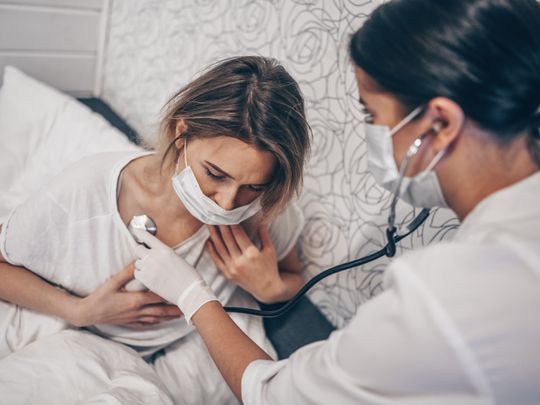
Abu Dhabi: Residents must seek immediate medical attention at the first sign of respiratory distress symptoms, even when they have only developed minor symptoms or are quarantining at home after exposure to a COVID-19 patient.
Prompt medical assessment will reduce COVID-19 complications and fatalities, doctors have said.
“Early detection of new cases and their contacts is an important and effective weapon in limiting the spread of the virus, and thus reducing complications and deaths. [And] early COVID-19 treatment continues to speeding the healing process, and reduces the possibility of developing complications leading to intensive care admissions or deaths,” Dr Farida Al Hosani, UAE government spokesperson for the health sector, explained during a government briefing.
Confusing symptoms
“We find that there are some people who neglect respiratory symptoms, and do not seek testing or diagnosis until their health deteriorates and they develop acute respiratory symptoms such as difficulty in breathing. COVID-19 symptoms are similar to the symptoms of the flu or the common cold, and it can only be differentiated through a PCR test,” she said.
Call for emergency help
“In the event that any respiratory symptoms appear, you must immediately call 999 or visit the nearest health centre. Quarantined individuals can go out in the event of any health emergency without the need to inform anyone; just go to the nearest hospital and request a medical report as evidence if you face a penalty,” Dr Al Hosani urged.
“Minor symptoms, especially among the elderly and people with chronic diseases, is one major indicator for the need to consult a doctor instead of relying on self-health care. Fast medical intervention to assess the disease, through medical tests and x-rays, is necessary even if the symptoms are mild, [so] as to start treatment early,” she added.
A week’s delay
Doctors said they have come across residents who have avoided going to the doctor for at least a week after developing symptoms.
“We see patients who come to the hospital a week or more after they had started manifesting the symptoms. This delay in consulting a doctor might worsen the condition of the person, because COVID-19 patients are likely to develop severe symptoms such as pneumonia and other complications. Recovery might also take a longer time, and some people might require oxygen or ventilator support,” said Dr. Mohamed Shafeeq, internal medicine specialist at Medeor Hospital.
Causes for delay
People delay medical treatment for a number of reasons, including the fear of receiving a COVID-19 diagnosis.
“Some patients are in denial, and refuse to acknowledge the possibility that they could be having COVID-19. They attribute symptoms to a change in weather, or a cold they have developed after a walk in the fog. But the COVID-19 virus is known to have maximum infectivity and transmission early on in the course of disease, and these kind of delays result in more spread,” said Dr Prashant C.K., specialist physician at Aster Clinic, Ajman.
The doctor added that others also delay the test because they have been vaccinated, but this too can be risky. “It is as yet unknown, the degree to a vaccinated person can transmit COVID-10 infection to others,” he cautioned.
“Finally, some people test for COVID-19 immediately after being exposed to a patient, and receive a negative result. As symptoms continue, they are under the false impression that they don’t have the disease since they tested negative, and they continue with their normal routines without isolation precautions. In reality, the time from exposure to symptom development can be four to 10 days,” he added.
At-risk groups
A delay in treatment is riskiest for individuals aged 50 years or older, as well as for those with chronic conditions like diabetes, hypertension and obesity. Among COVID-19 patients, these lifestyle diseases have routinely been associated with a high rate of death.
“In these patients, COVID 19 is likely to become severe at a rapid pace, and they would benefit from early care and attention,” Dr Prashanth advised.
Pregnant women should also be extra vigilant, especially as they cannot yet get vaccinated against COVID-19.
Disease worsening
While symptoms like a cough, chills and fever are common early symptoms of COVID-19, certain other symptoms indicate a worsening of the disease.
“Special caution needs to be taken when people start experiencing difficulty breathing. This may be noticed initially when they move around, and it could progress to difficulty breathing even when at rest. People also need to become concerned if high grade fever with chills continues and persists for more than 5-7 days. Other symptoms of impending worsening include an increase in the respiratory rate (rate of breathing), dizziness with tendency to falls, chest pain and cold hands and feet,” Dr CK said.
Doctors have also cautioned that the newer strains of COVID-19 have been seen affecting younger residents. They have then gone on to infect the elderly and others with chronic diseases, thus contributing to an increases in cases and deaths.
“International studies have shown that the risk of COVID-19 complications, hospitalisation and death doubles for people over 60 years of age and those with chronic disorders. We [therefore] call on all individuals experiencing symptoms to go to the nearest health centre, and to provide health authorities with information about individuals with whom they have been in contact,” officials have urged.
Common COVID-19 symptoms
Cough
Chills
Fever
Diarrhoea
Symptoms of worsening COVID-19
Breathing difficulties, even when at rest
Persistent high-grade fever
Increase in breathing rate
Dizziness
Chest pain
Cold hands and feet








